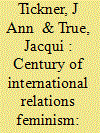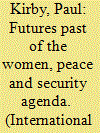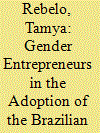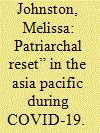|
|
|
Sort Order |
|
|
|
Items / Page
|
|
|
|
|
|
|
| Srl | Item |
| 1 |
ID:
160564


|
|
|
|
|
| Summary/Abstract |
We examine feminism in international relations from the emergence of women's peace pragmatism during WWI to the development of the United Nations (UN) Women, Peace, and Security (WPS) agenda a century later. We argue that feminism did not come late to international relations. Rather, international relations came late to feminism. Moreover, we show how the principles articulated by women peace activists at the 1915 Hague Conference represent distinct contributions to the discipline. These principles reflect a pragmatic approach derived from women's experiences of promoting peace and inclusion. The pragmatism of these principles is echoed by, and further developed in, four pillars of the WPS agenda—as shaped by advocates of women's rights, working through processes of trial and error, to gain state support for advance principles of equal and lasting peace. States may have rejected discussion of women's rights as an appropriate matter for international negotiations in 1915. But with the evolution of women's political rights during the twentieth century, it is now possible to advance a feminist perspective on international peace and security. By recovering neglected aspects of the last century of international relations’ feminism, this article helps further an alternative, pragmatist perspective on ways of knowing and doing international relations.
|
|
|
|
|
|
|
|
|
|
|
|
|
|
|
|
| 2 |
ID:
145277


|
|
|
|
|
| Summary/Abstract |
This article interrogates the sexual ideology of Finnish peacebuilding, the country's foreign policy brand and the Women, Peace and Security (WPS) agenda by examining the experiences of women ‘written out of history’. Using the method of ‘writing back’ I juxtapose the construction of a gender-friendly global peacebuilder identity with experiences in Finland after the Lapland War (1944–45) and in post-conflict Aceh, Indonesia (1976–2005). Although being divided temporarily and geographically, these two contexts form an intimate part of the abjected and invisible part of the Finnish WPS agenda, revealing a number of colonial and violent overtones of postwar reconstruction: economic and political postwar dystopia of Skolt Sámi and neglect of Acehnese women's experiences in branding the peace settlement and its implementation as a success. Jointly they critique and challenge both the gender/women-friendly peacebuilder identity construction of Finland and locate the sexual ideology of WPS to that of political economy and post-conflict political, legal and economic reforms. The article illustrates how the Finnish foreign policy brand has constructed the country as a global problem-solver and peacemaker, drawing on the heteronormative myth of already achieved gender equality on the one hand and, on the other, tamed asexual female subjectivity: the ‘good woman’ as peacebuilder or victim of violence. By drawing attention to violent effects of the global WPS agenda demanding decolonialization, I suggest that the real success of the WPS agenda should be evaluated by those who have been ‘written out’.
|
|
|
|
|
|
|
|
|
|
|
|
|
|
|
|
| 3 |
ID:
145279


|
|
|
|
|
| Summary/Abstract |
The Women, Peace and Security (WPS) agenda has developed at the United Nations over the course of the past 15 years, and there have been critical engagements with it for nearly as long. In this article, we first take stock of the operationalization of the WPS agenda, reviewing its implementation across a number of sectors. In the second section, we expose the tensions that have marked the WPS agenda from the start. With others, we argue that there has been a narrowing of the agenda's original scope, reducing it to the traditional politics of security rather than reimagining what security means. We highlight this reduction primarily through an analysis of the tension between the ‘participation’ and ‘protection’ pillars of the agenda. Further, we argue that the WPS agenda faces a current challenge in terms of the actors entrusted with it. Although in some ways involving civil society, the consolidations and implementation of WPS principles at the national and international levels have become increasingly state-centric. Third, we imagine some possible futures of the agenda, from a trajectory characterized by increasing marginalization or even irrelevance, to new avenues like the emergent, albeit tentative, ‘Men, Peace and Security’ agenda. We close with an argument for a revival of the WPS agenda beyond a fixation on states, beyond a narrow heteronormative or essentialist focus on the ‘Women’ of the WPS resolutions, and moving towards the radical reimagining of security as peace that inspired the original architects of these important resolutions.
|
|
|
|
|
|
|
|
|
|
|
|
|
|
|
|
| 4 |
ID:
184657


|
|
|
|
|
| Summary/Abstract |
On 8 March 2017, International Women’s Day, Brazil adopted a two-year National Action Plan (NAP) on Women, Peace and Security (WPS) with a clear commitment by the government for integrating gender perspectives in peace and security policies. With this decision, Brazil responded to the UN Security Council’s call for all Member States to develop national strategies to allow for successful implementation of Security Council Resolution 1325 (2000). Considering that it took almost two decades for Brazil to consider adopting its own plan, the driving forces behind this decision beg further exploration. This article draws on the concept of gender entrepreneurs to argue that the emergence of the Brazilian NAP was the result of an informal network of like-minded women, positioned inside and outside the government’s structures, who teamed up to harness political opportunities for change and push for the adoption of WPS global norms into a formal national commitment.
|
|
|
|
|
|
|
|
|
|
|
|
|
|
|
|
| 5 |
ID:
145275


|
|
|
|
|
| Summary/Abstract |
The European Union is seen to operate at the international level by promoting ideas and values, rather than by exerting military or economic power. As a gender actor, the EU has played a key role in the development of formal equality, which is presented as a foundational principle of European integration. It therefore follows that normative power Europe should seek to promote these values in external affairs. This article interrogates the role of the EU as a normative gender actor in relation to its implementation of the Women, Peace and Security (WPS) agenda, set out in UN Security Council Resolution 1325 and related resolutions. Documentary analysis will be supplemented by a detailed assessment of speeches and public statements about the role of the EU as a gender actor in external affairs. This data will be used to assess whether there is a disjuncture between the dominant narrative about gender equality as a fundamental value of the EU and the actions of the organization. It will also allow us to assess whether gender mainstreaming is a tool for public diplomacy or has made a significant change to the way the external relations agenda is formulated and implemented. Additionally, the article will draw attention to the institutional obstacles to the EU performing a role as a gender actor in external affairs. It identifies a critical tension between framing the WPS resolutions as an extension of the EU's equality on the one hand, and understanding that gender mainstreaming is a mere policy tool in international affairs. In doing so, it highlights how competing institutional demands can ultimately undermine core values (e.g. equality) when they are used instrumentally.
|
|
|
|
|
|
|
|
|
|
|
|
|
|
|
|
| 6 |
ID:
192542


|
|
|
|
|
| Summary/Abstract |
COVID-19 has disrupted social, economic and political life across the Asia Pacific region, with particularly deleterious impacts on women. Rather than equitably affecting all, COVID-19 has brought about a “patriarchal reset”, exacerbating women’s health and care labour burdens and heightening the physical violence against women and other threats to women’s human rights. This paper examines global health governance in the region from a feminist political economy perspective. We ask how has the pandemic and associated lockdowns affected women’s safety and access to economic resources and services on the one hand, and ‘women, peace and security’ (WPS) practitioners’ capacity to safeguard women’s rights in fragile settings on the other hand? We examine the gendered impacts of COVID-19 based on two surveys of WPS practitioners during 2020. Significant rises in domestic and gender-based violence, reduced access to reproductive health services, and increased income insecurity were all perceived and/or experienced during COVID-19 restrictions. WPS practitioners delivered services to mitigate these effects of COVID-19 despite overall less funding than before COVID-19. With the benefit of primary data, we explore how a more radical approach is needed to understand and transform gender relations in light of gender-based violence and depletion of women’s labour.
|
|
|
|
|
|
|
|
|
|
|
|
|
|
|
|
| 7 |
ID:
178121


|
|
|
|
|
| Summary/Abstract |
Examining the visual (re)production of the Women, Peace and Security (WPS) agenda through UK national action plans and annual reports to parliament, this article proposes a new direction for WPS research. The visual politics of WPS, which affects both how the agenda is enacted and how it is encountered, has been largely understudied. To date, WPS scholarship has focused predominantly on linguistic modes of communication, neglecting both the visual aspect of WPS communication and the visual politics of WPS. The article argues that, as a vector of power, visuals matter in the agenda's (re)production, and therefore develops a theoretical and methodological framework to study the visual politics of WPS. In presenting the most comprehensive visual analysis of the WPS agenda to date, this article makes three distinct contributions to the literature. Firstly, it offers a theoretical contribution advancing visuality as a vector of power in the reproduction of WPS. Secondly, it proposes a methodological contribution by developing an analytical framework constructed around a visibility spectrum. Thirdly, it provides an empirical contribution through its focus on the UK as an illustrative case of visual reproduction. The visual analysis reveals four subject-positions placed on a visibility spectrum: the (hypervisible) ‘agential woman-in-conflict’, the (absent presence) of the ‘woman-as-victim’, the (visibility) of the ‘international community’, and the (invisibility) of ‘men and boys’. The analysis demonstrates that rather than challenging global hierarchies of power, these mutually constituted subjects visually reproduce particular gendered, racialized and colonial logics, further stripping the agenda of its transformative potential.
|
|
|
|
|
|
|
|
|
|
|
|
|
|
|
|
| 8 |
ID:
145274


|
|
|
|
|
| Summary/Abstract |
Recognizing the critique of sexual essentialism in the Women, Peace and Security (WPS) agenda, this article moves beyond this familiar narrative to address the narrowness of conflict frames that have to date been engaged by the WPS agenda. The events of 11 September 2001 brought new urgency and vibrancy to state action in the realm of counterterrorism. This momentum was illustrated both by the response of national legal systems and by more concerted efforts to achieve multilateral and multilevel counterterrorism cooperation on the international level. Notably, terrorism and counterterrorism have long been of only marginal interest to mainstream feminist legal theorists. Until recently concerted analytical feminist scrutiny has been missing in the assessment of terrorism, radicalism and counterterrorism discourses. This article addresses the lack of attention to terrorism, counterterrorism and countering violent extremism (CVE) initiatives in the WPS mandate and its consequences for mainstreaming gender interests in foundational aspects of peace and security practice. Recent normative augmentations including UNSCR 2242 and the amplified mandate of the Counter-Terrorism Committee to include gender considerations are assessed. The article argues that these moves to include gender come late, and on the terms set by security-minded states. The late attention to gender in counterterrorism leaves little capacity to produce an inclusive and reimagined feminist agenda addressing the causes conducive to the production of terrorism and the costs to women of counterterrorism strategies. This pessimistic assessment warns of the pitfalls of exclusion and inclusion in the new security regimes that have been fashioned post 9/11 by states.
|
|
|
|
|
|
|
|
|
|
|
|
|
|
|
|
|
|
|
|
|